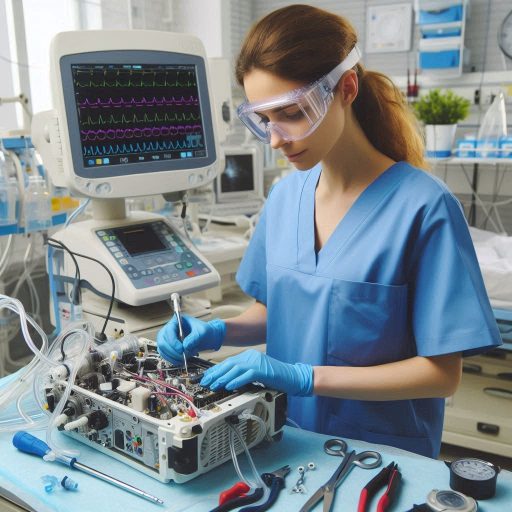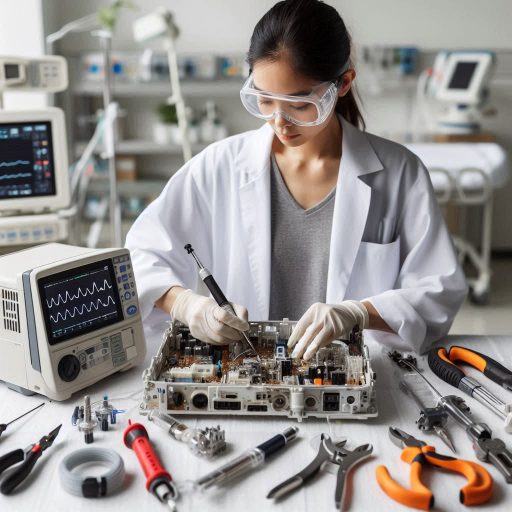Introduction
Certifications are vital for biomedical equipment technicians (BMETs) as they play a key role in career development and job performance.
These credentials validate a technician’s skills and knowledge in managing, maintaining, and repairing complex medical equipment.
For BMETs, obtaining certifications demonstrates expertise and commitment to high standards of patient care and equipment reliability.
Certifications ensure that BMETs are proficient in the latest technologies and industry practices, which is crucial in a field where precision and up-to-date knowledge are essential.
They also enhance job prospects, as employers often prefer certified technicians for their specialized skills and dedication to maintaining medical equipment.
Additionally, certifications can lead to career advancement opportunities and higher earning potential.
This blog post aims to provide a comprehensive overview of various certifications available for BMETs.
It will explore key certifications, their specific purposes, and the benefits they offer.
By detailing these certifications, the post will help BMETs make informed choices about which credentials align best with their career goals and professional growth.
Understanding these options will assist technicians in enhancing their qualifications and advancing their careers in the biomedical field.
Types of Certifications
- Certified Biomedical Equipment Technician (CBET)
- Certified Radiology Equipment Specialist (CRES)
- Certified Laboratory Equipment Specialist (CLES)
- Certified Healthcare Technology Manager (CHTM)
- Certified Biomedical Auditor (CBA
- Certified Clinical Engineer (CCE)
Certified Biomedical Equipment Technician (CBET) Certification
The Certified Biomedical Equipment Technician (CBET) certification is a prestigious credential for professionals in the biomedical equipment field.
Offered by the Association for the Advancement of Medical Instrumentation (AAMI).
This certification focuses on the essential knowledge and skills required to maintain and repair medical equipment.
Achieving the CBET certification signifies a technician’s expertise and dedication to ensuring the safety and functionality of critical healthcare devices.
Earning the CBET certification is a significant step towards career advancement for biomedical equipment technicians.
It distinguishes professionals in a competitive job market, making them more attractive to employers.
Additionally, certified technicians are often eligible for higher salaries and leadership roles within their organizations.
The CBET certification is a valuable investment in a technician‘s professional growth and long-term career success.
Offered by the International Certification Commission
The CBET certification is awarded by the International Certification Commission (ICC), in collaboration with AAMI.
This partnership ensures that the certification meets the highest industry standards and is recognized globally.
The ICC oversees the certification process, ensuring that it is rigorous and relevant to the evolving demands of the biomedical field.
Earning the CBET certification from such a respected body enhances a technician‘s credibility and career prospects.
Focus on Medical Equipment Maintenance
The CBET certification emphasizes the importance of medical equipment maintenance, a critical aspect of healthcare operations.
Technicians with this certification are trained to handle various tasks, from routine maintenance to complex repairs.
Their role is essential in minimizing equipment downtime and ensuring that medical devices function accurately and reliably.
The CBET certification prepares technicians to manage the challenges associated with keeping sophisticated medical equipment in optimal condition.
Obtaining the CBET certification validates a technician‘s competency in the biomedical field.
It assures employers and healthcare institutions that the technician has the necessary skills and knowledge to perform their duties effectively.
This certification is often a requirement for advanced positions within hospitals, clinics, and medical equipment manufacturers.
It not only enhances job security but also opens doors to higher-level roles and increased responsibilities.
Read: Field vs. Office Work in Surveying and Mapping
Importance of Certifications
Certifications are crucial for Biomedical Equipment Technicians (BMETs) as they validate specialized skills.
Ensuring competence in maintaining and repairing medical devices.
They demonstrate a technician‘s commitment to professional development and adherence to industry standards, which is vital for ensuring patient safety.
Certifications also enhance job prospects by making technicians more attractive to employers, often leading to career advancement opportunities and higher salaries.
By earning certifications, BMETs not only prove their expertise but also stay current with the latest technologies and best practices in the ever-evolving biomedical field.
Enhancing Job Opportunities and Career Advancement
Certifications significantly increase job opportunities for Biomedical Equipment Technicians (BMETs).
Earning a certification like Certified Biomedical Equipment Technician (CBET) makes you a more attractive candidate to employers.
With healthcare facilities constantly seeking skilled professionals, certified BMETs are often given preference during hiring processes.
This credential demonstrates your commitment to the field and your willingness to meet industry standards.
Career advancement is another key benefit of certification.
As a certified BMET, you have a competitive edge for promotions and higher-level positions.
Certifications such as Certified Radiology Equipment Specialist (CRES) or Certified Laboratory Equipment Specialist (CLES).
Employers recognize the value of these credentials, often rewarding certified technicians with higher salaries and more responsibilities.
Demonstrating Proficiency and Expertise
Certification demonstrates your proficiency and expertise in handling medical equipment.
It confirms that you possess the necessary skills to perform complex tasks like troubleshooting, repairing, and maintaining various types of medical devices.
When you earn certifications like CBET or CRES, you show that you have undergone rigorous.
This proficiency is crucial in the healthcare industry, where the performance.
Employers rely on certified BMETs to ensure that equipment is functioning properly and that any issues are promptly addressed.
Your certification serves as proof that you are capable of handling these critical responsibilities with precision and care.
Ensuring Compliance with Industry Standards
Certifications also ensure compliance with industry standards and regulations.
Healthcare facilities must adhere to strict guidelines to maintain patient safety and meet regulatory requirements.
As a certified BMET, you demonstrate your understanding of these standards and your ability to apply them in your work.
Certifications like CBET and CRES often require continuing education.
This ongoing learning process ensures that you remain compliant with current .
Employers value this compliance, as it reduces the risk of equipment failures.
By maintaining certification, you contribute to a safer healthcare environment.
Read: Importance of Accuracy in Surveying and Mapping
Requirements for Certifications
Education: High School Diploma or Equivalent
Becoming a certified Biomedical Equipment Technician (BMET) starts with a solid educational foundation.
A high school diploma or equivalent is the minimum requirement for entering this field.
Courses in mathematics, science, and electronics during high school are particularly beneficial.
These subjects provide the basic knowledge needed for further training and certification.
While a high school diploma is the minimum requirement, many aspiring BMETs pursue additional education.
Enrolling in a vocational or technical school program can enhance your understanding of biomedical technology.
These programs often offer specialized training in electronics, medical terminology, and equipment maintenance.
An associate degree in biomedical technology or a related field is also a valuable credential.
Work Experience: Gaining Practical Experience in the Field
After completing your education, gaining practical work experience is crucial.
Most certifications for Biomedical Equipment Technicians require a certain number of years working in the field.
This hands-on experience allows you to apply the knowledge gained during your education in real-world settings.
During this period, you will work with various medical devices, from diagnostic machines to life-support equipment.
You‘ll learn to perform routine maintenance, troubleshoot issues, and repair complex systems.
The experience you gain on the job is invaluable for developing the skills needed to excel as a BMET.
Employers often prefer candidates with experience in a healthcare setting.
Working in hospitals, clinics, or medical equipment manufacturers exposes you to the types of equipment you‘ll manage throughout your career.
This experience also helps you become familiar with industry standards and regulatory requirements.
Exam: Demonstrating Knowledge and Skills Through Certification
Once you‘ve gained sufficient education and experience, the next step is certification.
Certification exams are designed to test your knowledge and skills in biomedical equipment technology.
Passing these exams demonstrates your competence and dedication to the field.
The CBET exam covers topics such as anatomy, physiology, electronics, and safety practices.
Preparing thoroughly for this exam is essential, as it requires a deep understanding of the material.
Certification is not only a requirement for many employers but also a mark of professionalism.
It shows that you have met industry standards and are committed to ongoing professional development.
Maintaining certification typically involves continuing education, ensuring you stay current with advances in biomedical technology.
Read: Surveying and Mapping Technician: Job Satisfaction

Benefits of Obtaining Certifications
Obtaining certifications offers numerous benefits for Biomedical Equipment Technicians (BMETs).
Certifications enhance job security by validating expertise, making technicians more competitive in the job market.
They often lead to career advancement opportunities, such as promotions and higher salaries.
Additionally, certifications help technicians stay updated with the latest industry standards and technologies.
Overall, certifications boost professional credibility, open doors to new opportunities, and contribute to long-term career growth.
Higher Earning Potential
Earning certifications as a Biomedical Equipment Technician (BMET) significantly boosts your earning potential.
Employers highly value certified technicians, often offering higher salaries to those with recognized credentials.
Certifications demonstrate your expertise and commitment to the field, making you more competitive in the job market.
As a result, you can command a higher starting salary and enjoy greater opportunities for salary growth over time.
Additionally, certified BMETs are often considered for promotions and advanced roles more quickly.
These roles typically come with increased responsibilities and higher compensation.
The investment in obtaining certifications pays off in the long run, as it positions you for higher-paying positions within the healthcare industry.
In an increasingly competitive job market, certifications can be the key to unlocking better financial opportunities.
Recognition Within the Industry
Certifications provide significant recognition within the biomedical equipment field.
They serve as a testament to your skills, knowledge, and professionalism.
Earning certifications like Certified Biomedical Equipment Technician (CBET) or Certified Radiology Equipment Specialist.
Industry professionals and employers recognize these certifications as marks of quality and reliability.
Having certifications on your resume can set you apart when applying for jobs or seeking promotions.
Employers look for certified technicians who have proven their ability to handle complex tasks and maintain high standards of work.
Certification also opens doors to networking opportunities, as it connects you with a community of other certified professionals who share your commitment to excellence.
This recognition within the industry enhances your professional reputation and can lead to more career advancement opportunities.
Opportunities to Work in Various Healthcare Settings
Certifications expand your opportunities to work in diverse healthcare settings.
With recognized credentials, you can find employment in hospitals, clinics, medical device companies, and other healthcare facilities.
Certified BMETs are in demand across a wide range of environments, from large urban hospitals to smaller rural clinics.
This variety allows you to choose the work setting that best suits your preferences and career goals.
Certified technicians are also more likely to be considered for specialized roles in areas like radiology, anesthesia, or dialysis equipment.
These positions often offer unique challenges and learning experiences, enhancing your skills and career development.
Working in different healthcare settings also provides exposure to various technologies and medical practices.
Transform Your Career Today
Unlock a personalized career strategy that drives real results. Get tailored advice and a roadmap designed just for you.
Start NowRead: Online Courses for Surveying and Mapping Technicians
Continuing Education and Maintenance of Certifications
Maintaining certifications as a Biomedical Equipment Technician (BMET) requires commitment to ongoing education and professional development.
Many certifications are not permanent and need periodic renewal through continued learning and training.
This ensures that BMETs stay current with advancements in technology and the medical devices they work with daily.
The Necessity of Ongoing Education
Many BMET certifications require continuing education to remain valid.
Certification bodies often mandate that technicians earn a certain number of continuing education units (CEUs) within a specified period.
These CEUs can be earned by attending workshops, seminars, or online courses relevant to biomedical technology.
Regularly updating your knowledge ensures you remain competent and effective in your role, which is crucial in an industry where technology evolves rapidly.
Staying Current with Technological Advancements
The field of biomedical equipment is continuously evolving, with new technologies and equipment being developed regularly.
BMETs must stay updated with these advancements to maintain their effectiveness in the workplace.
Continuing education helps BMETs learn about the latest developments in medical equipment, new diagnostic tools, and updated regulatory standards.
Staying current with these advancements not only helps in maintaining certification but also ensures that BMETs.
Regular participation in training programs and technical courses helps BMETs adapt to new technologies and methodologies.
It ensures that technicians are equipped to handle the latest equipment, troubleshoot new devices, and apply updated safety protocols.
This adaptability is vital for keeping up with the fast-paced changes in medical technology and maintaining the high standards expected in healthcare environments.
Professional Development and Certification Maintenance
Participation in professional development activities is often necessary to maintain certifications.
These activities might include attending industry conferences, participating in hands-on training sessions, or engaging in research related to biomedical technology.
Professional organizations and certification bodies often provide opportunities for BMETs to earn credits toward their certification renewal.
Engaging in these activities not only helps maintain certification but also fosters a deeper.
BMETs who actively pursue continuing education and professional development are better positioned for career advancement.
They demonstrate a commitment to their profession and show that they are dedicated to staying informed and competent in their roles.
This commitment is often recognized by employers, leading to greater job security, opportunities for promotion, and increased professional recognition.
Gain More Insights: Effective Communication Skills for Telecommunications Technicians
Find Out More: Cybersecurity Analyst Work Environment: What to Expect
Gain More Insights: Automotive Engineering Projects for Beginners
Conclusion
Certifications hold significant importance for Biomedical Equipment Technicians (BMETs) in the healthcare industry.
They not only validate your technical skills and knowledge but also ensure that you are capable of performing high-quality.
For example, certifications like CBET (Certified Biomedical Equipment Technician) and CRES.
(Certified Radiology Equipment Specialist) are widely recognized and respected in the field.
They demonstrate your proficiency and commitment to maintaining the safety and functionality of healthcare technology.
Pursuing these certifications can greatly enhance your career prospects.
They help you stand out in a competitive job market and can lead to more advanced job opportunities.
Certified BMETs often have access to better job positions, higher salaries, and increased job security.
Employers value certification as it signifies a higher level of expertise and dedication.
Moreover, the field of biomedical technology is constantly evolving with new advancements and innovations.
Continuous learning and professional development are crucial to keep up with these changes.
By regularly updating your knowledge and skills through additional training and certifications, you stay current with the latest technologies and best practices.
[E-Books for Sale]
The Big Book of 500 High-Paying Jobs in America: Unlock Your Earning Potential
$19.99 • 500 High-Paying Jobs • 330 pages
Explore 500 high-paying jobs in America and learn how to boost your career, earn more, and achieve success!
See All 500 High-Paying Jobs of this E-Book
1001 Professions Without a Degree: High-Paying American Jobs You Can Start Now
$19.99 • 1001 Professions Without a Degree • 174 pages
Discover 1001 high-paying jobs without a degree! Unlock career tips, skills, and success strategies for just $19.99!




